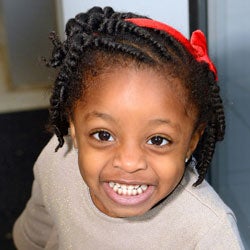ALCAPA
You see it on TV all the time, says Krystal Hayes, maybe in a commercial or a primetime medical drama: A family reeling from a child’s serious diagnosis, uncertain of what the future holds. You never think it could happen to you. Then it does. It was like whirlwind, Krystal recalls. The instant doctors at Children’s of Alabama diagnosed her 4-month-old daughter, Kelsey, with a congenital heart defect known as Anomalous Left Coronary Artery from the Pulmonary Artery, or ALCAPA, the care team sprung to action, admitting Kelsey for surgery and preparing her family for an extended hospital stay. “It was scary,” Krystal said. “When Kelsey was born, she was healthy and everything was fine.” ALCAPA occurs while a baby’s heart develops early in pregnancy. The left coronary artery, which carries blood to the heart muscle, is connected to the pulmonary artery instead of the aorta. When Kelsey first came home from the hospital, she initially showed no symptoms. But as the days and weeks progressed, Kelsey failed to gain weight. It was thought Kelsey had reflux, so her pediatrician referred her to a GI specialist. Nurse Practitioner Megan Moseley detected a heart murmur in Kelsey and suggested she have an electrocardiogram, or EKG, exam. While driving home from the appointment, Krystal received a call. Kelsey’s EKG was abnormal. “That’s when we were referred to Dr. Mark Law at Children’s,” Krystal said. “He told my Mom and I we won’t be going anywhere – Kelsey’s heart is really sick. I had to make a phone call to my husband, Patrick, who was on military duty in Anniston.” Dr. Robert Dabal performed Kelsey’s surgery in August 2015. Her recovery was slow going and the care team prepared to place Kelsey on the transplant list. But then Kelsey began to show signs of improvement, gaining weight and meeting her physical therapy goals. Kelsey’s gains were so significant that she was removed from the transplant list and discharged the day before Thanksgiving. Kelsey returned home with a feeding tube, and thanks to Hand In Hand Early Intervention, Kelsey had her feeding tube removed after passing her swallow study in March 2016. “We went home on 11 medications,” Krystal said. “Now we’re down to two meds a day. She’s in daycare and living a normal life, playing and wrestling with her brothers and playing dress up. She’s come a long way.” Krystal continued, “It was a stressful time, but we had to pray through it. Your faith is tested, you get down, but there was always someone who had encouraging words. The team at Children’s is going to do whatever it needs to do to save our child. It was a scary journey, but it’s good to have positive people along the way to see you through.”







